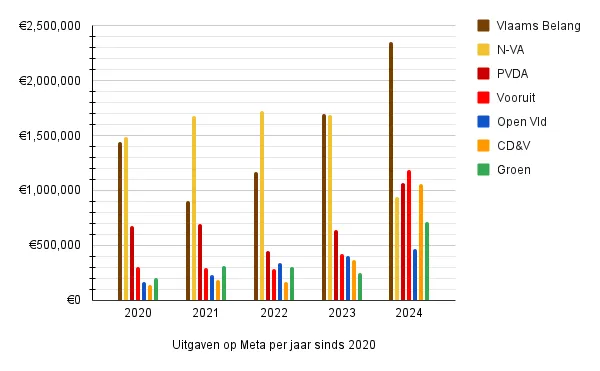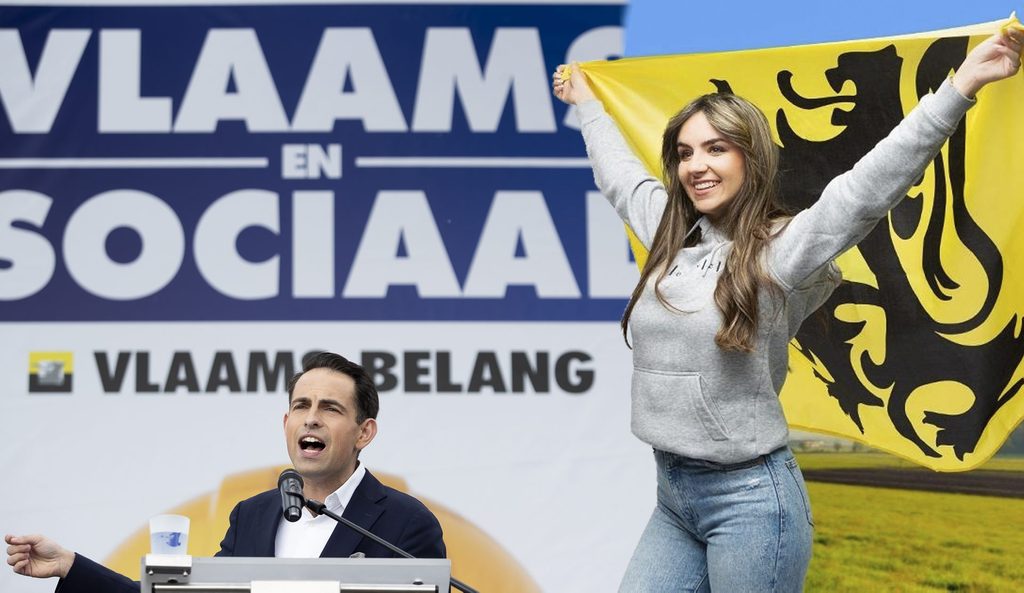Political parties in Belgium spent €15 million on online ads in 2024, a year dominated by elections. Right-wing parties in Flanders were once again the biggest spenders.
Last year, people in Belgium headed to the polls to vote in the federal, regional, European and local elections. To win over voters, many parties relied on digital advertising, as shown in the latest annual report for online political ads AdLens – an association working for more transparency on political ads.
Belgian political parties at all levels spent €11,012,070 (excluding VAT) on Meta (Facebook and Instagram) and €1,455,850 (excluding VAT) on Google (mainly YouTube). When adding this together and including VAT, the total spending rises to €15,086,183. Political ads are not tracked separately on TikTok and LinkedIn, so the report does not include this data.
In five years, the spending via both companies has more than doubled. In 2020, a year after the 2019 elections, parties and politicians together spent just under €6 million on ads on Meta and Google.
"For Belgium, this is record spending since the beginning of our reports (2020) on both platforms," AdLens wrote in its report. "On both Google and Meta, Belgian parties and candidates are among the largest advertisers at the European level."
Vlaams Belang continues to top list
The far-right Dutch-speaking party Vlaams Belang – which has been the biggest spender in past reports – again topped the list in 2024. Its spending on social media rose significantly from €1.70 million to €2.35 million. Almost half of this budget (42%) went to the national party channels on Facebook and Instagram.
Meanwhile, N-VA – the biggest winner of the federal elections – spent significantly less than in previous years on social media (€960,000 compared to €1.69 million in 2023, the year running up to the elections).

Spending on Meta per party since 2020. Credit: AdLens
It marks the first time since 2020 that the party is not in the top three. Vooruit was the second-largest spender on Meta, with a budget of €1.19 million, compared to €420,000 in 2023. The Dutch-speaking socialists put their money on individual candidates and leaders (63% of the total budget). In third place was the Workers' Party PTB/PVDA (€1.07 million).
The amount of money that was spent on Google ads tripled compared to 2023. Combined, the parties bought €1.46 million in ads, compared to €500,000 in 2023. "This amount is also significantly higher than all previous years," AdLens said. In 2019, the previous election year, a total of €396,000 was spent by all parties.
Vlaams Belang also spent the most (€391,000) on Google ads, this time followed by Vooruit (€284,000) and Groen (€189,000). The biggest Google spending took place in May and June for the federal and regional elections. Significantly less was spent on Google ads for the local elections.
Male-dominated
AdLens notes that 70% of political advertisers spending more than €500 on Meta are men. "We can partly attribute this remarkable difference to the party chairs: not infrequently, they are allocated the largest budget by their party (the top ten candidates consist of six party leaders), and most parties have a male leader."
The top 15 includes ten men. The first woman on the list is Melissa Depraetere of Vooruit, in fifth position.
Belgium wasn't the only country to hold elections in 2024. There were also the European elections, as well as national elections in Ireland, France, Croatia, Iceland and the United Kingdom, among others. However, even taking this into account, Belgian parties and candidates are among the "biggest spenders".
Related News
- Corporate lobbying threatens PFAS restrictions - Decontamination costs €100 bn per year
- 'Murdoch on speed': Why is Elon Musk meddling in European politics?
Britain's Labour Party (€1.4 million) and Prime Minister Keir Starmer (€1.3 million) top the list, followed by Hungary's Fidesz, which spent €1 million in 2024. Next is Vlaams Belang, which spent €1 million at the party level, with another €624,000 for frontrunner Tom van Grieken (placing him in 11th place in the European leader ranking).
"However, we cannot examine all campaign spending on social media in as much detail as we did for Belgium, meaning we cannot draw definitive conclusions about the full spending of parties," AdLens concluded.
Belgium does not impose a maximum budget for social media ads on parties. These latest figures spurred the Dutch-speaking green party Groen to renew its calls for a spending cap on social media. "These are staggering sums that could have been put to much better use," Chamber party leader Stefaan Van Hecke said. He argued this creates an "imbalance in information voters receive."

